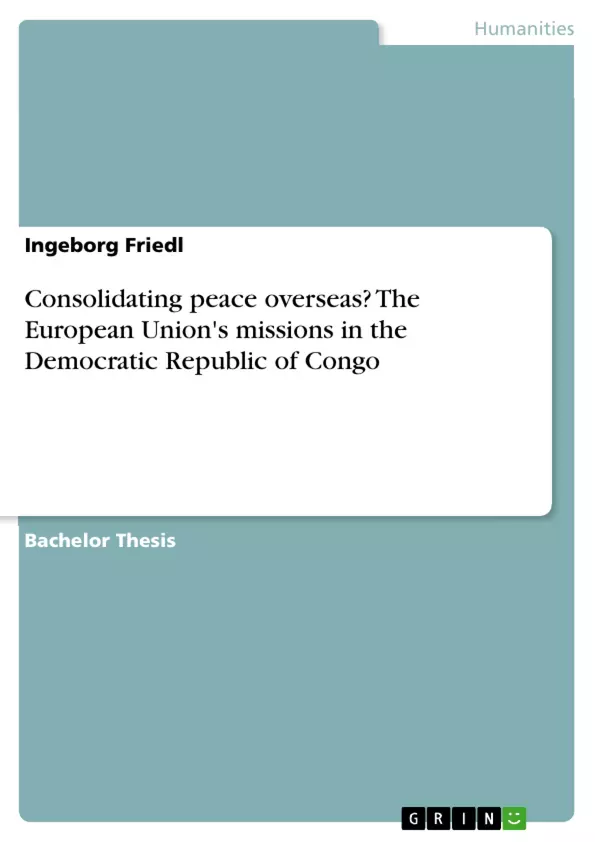In 2006 the EU launched its first autonomous military operation under Chapter VII of the UN Charter in the war-torn Democratic Republic of Congo. Mission Artemis, as it was codenamed, was followed by a series of policies to reform the Congolese institutions, the justice system, the police and the army. This dissertation investigates whether these reforms are helping to build lasting peace in the DRC. In particular, this study focuses on the EU’s efforts in improving civil and political rights, such as the right to free speech and a free press, as well as freedom of association; the constitution that codified these rights; the administration of democratic elections; and finally, due process in the police, judiciary and army.
Inhaltsverzeichnis (Table of Contents)
- INTRODUCTION
- PART I LITERATURE REVIEW
- PART II THE HISTORICAL CONTEXT
- The Rwandan genocide as precursor to an unknown war
- The legacies of the past
- PART III THEORETICAL ASPECTS OF PEACEBUILDING
- The role of democratisation
- Transitional justice in post-conflict societies
- PART IV THE EUROPEAN UNION'S ROLE IN THE DRC
- Introduction
- The new Congolese constitution
- Democratic elections
- Civil society and the media
- Restoring law and order
- The police reforms
- Reforming the army
- Evaluation of the EU assistance to the DRC
- CONCLUSION
Zielsetzung und Themenschwerpunkte (Objectives and Key Themes)
This dissertation examines the effectiveness of the European Union's (EU) peacebuilding activities in the Democratic Republic of Congo (DRC) in fostering lasting peace. It aims to assess whether the EU's reforms in various institutions, including the legal system, police, and army, are contributing to a stable and peaceful environment.
- The EU's role in conflict termination and peacebuilding
- The historical context of the First and Second Congo Wars and their impact on Congolese institutions
- The theoretical importance of democratisation and justice for peacebuilding
- The EU's specific interventions in the DRC, such as drafting the new constitution, promoting civil society and media, safeguarding elections, and reforming the legal system, police, and army
- The EU's overall contribution to peace consolidation in the DRC
Zusammenfassung der Kapitel (Chapter Summaries)
- Chapter one reviews the existing literature on the EU's involvement in conflict termination and peacebuilding, providing a theoretical framework for the dissertation.
- Chapter two presents a historical background of the First and Second Congo Wars, analyzing their consequences for Congolese institutions and setting the stage for the EU's interventions.
- Chapter three discusses the theoretical importance of democratisation and transitional justice in achieving sustainable peace in post-conflict societies, highlighting their relevance to the DRC context.
- Chapter four delves into the EU's peacebuilding activities in the DRC, examining its specific interventions in areas such as the new constitution, civil society and media, elections, and security sector reforms.
Schlüsselwörter (Keywords)
This dissertation focuses on the EU's role in peacebuilding, the DRC's historical context, democratisation, transitional justice, security sector reform, civil society, media, and elections. It examines the EU's contributions to the peace process in the DRC, drawing on official documents, online reports, and interviews with key policy actors.
Frequently Asked Questions
What was "Mission Artemis" in the DRC?
It was the EU's first autonomous military operation under the UN Charter, launched in 2006 in the war-torn Democratic Republic of Congo.
What areas of reform did the EU focus on in the Congo?
The EU focused on reforming Congolese institutions, the justice system, the police, and the army to build lasting peace.
How did the EU support democratic processes in the DRC?
The EU assisted in drafting a new constitution, promoting a free press, and supporting the administration of democratic elections.
What is the role of transitional justice in this context?
Transitional justice is discussed as a theoretical necessity for post-conflict societies to achieve sustainable peace and accountability.
Does the dissertation evaluate the success of these missions?
Yes, the final part of the dissertation evaluates the EU's overall assistance and its effectiveness in consolidating peace in the DRC.
- Quote paper
- Ingeborg Friedl (Author), 2008, Consolidating peace overseas? The European Union's missions in the Democratic Republic of Congo, Munich, GRIN Verlag, https://www.grin.com/document/162659



